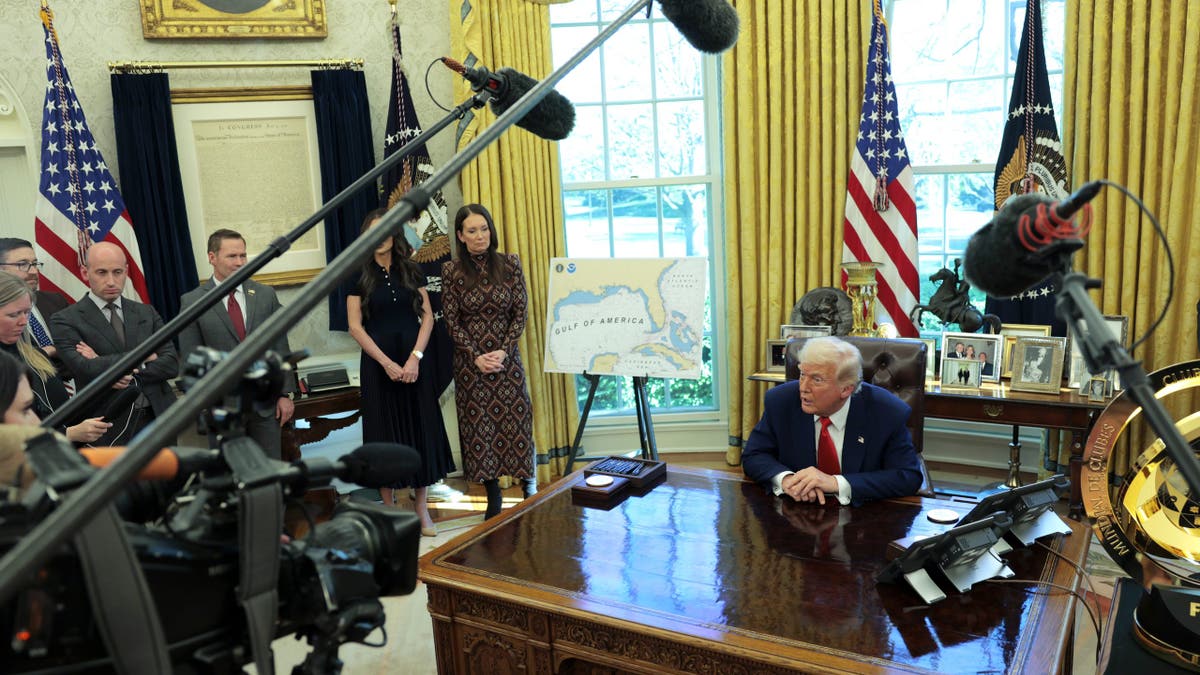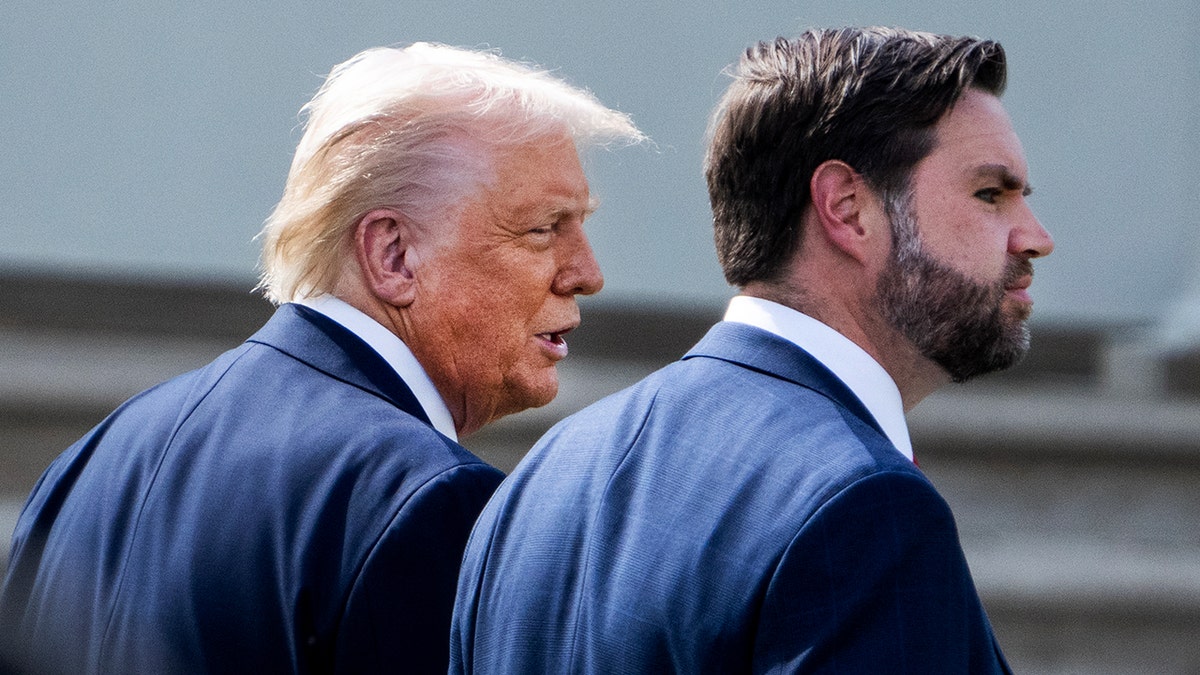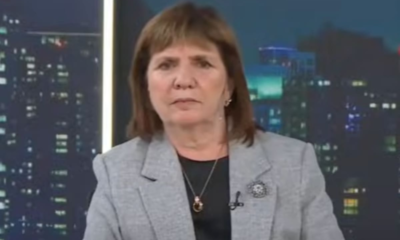INTERNACIONAL
Here’s what happened during Trump’s 12th week in office
President Donald Trump ramped up steep tariffs against Chinese imports to the U.S. this week while alleviating them for other countries during trade negotiations this week. He also signed a series of executive orders aimed at repealing Biden-era restrictions.
The Trump administration announced Wednesday it would lower reciprocal tariffs on other countries, while also revealing that the administration would immediately hike tariffs on Chinese goods to 145%. In response, China has raised its tariffs on U.S. goods to 125%.
Trump disclosed historic tariffs in a ceremony at the White House’s Rose Garden for a «Make America Wealthy Again» event on April 2, asserting that these new duties would generate new jobs for U.S. workers.
HOW WE GOT TO LIBERATION DAY: A LOOK AT TRUMP’S PAST COMMENTS ON TARIFFS

Treasury Secretary Scott Bessent departs following a tariff announcement in the Rose Garden of the White House in Washington, D.C., on Wednesday, April 2, 2025. (Photographer: Jim Lo Scalzo/EPA/Bloomberg via Getty Images)
The tariff plan established a baseline tax of 10% on all imports to the U.S., along with customized tariffs for countries that place higher tariffs on U.S. goods. The baseline tariffs of 10% took effect Saturday, while the others took effect Wednesday at midnight.
But Trump announced in a post on Truth Social Wednesday that reciprocal tariffs announced last week would remain paused for 90 days, during which period the countries would only face the baseline 10% tariff.
«At some point, hopefully in the near future, China will realize that the days of ripping off the U.S.A., and other Countries, is no longer sustainable or acceptable,» Trump posted on his Truth Social media platform on Wednesday.
Secretary of the Treasury Scott Bessent said that the tariffs suggest that China is at odds with the rest of the world.
«China is the most imbalanced economy in the history of the modern world,» Bessent told reporters Wednesday. «They are the biggest source of the U.S. trade problems, and indeed they are the problem for the rest of the world.»
Here’s what also happened this week:
Shipbuilding, water pressure executive orders
Trump also signed an executive order this week aimed at reinvigorating the shipbuilding industry in the U.S., amid concerns that China is outpacing the U.S. in production.
China is responsible for more than 50% of global shipbuilding, compared to just 0.1% from the U.S., according to the Center for Strategic and International Studies.
The executive order requires agencies to craft a Maritime Action Plan and instructs the United States Trade Representative to provide a list of recommendations to deal with China’s «anticompetitive actions within the shipbuilding industry,» among other things.
TRUMP ENDS BIDEN-ERA WATER REGULATIONS TO ‘MAKE AMERICA’S SHOWERS GREAT AGAIN’

President Donald Trump speaks to reporters as he signs executive orders in the Oval Office of the White House on April 9, 2025. (Getty Images)
Trump also signed an executive order to reverse Obama- and Biden-era conservation measures that limited water pressure in showers in an attempt to «make showers great again.» Former President Barack Obama initially imposed the water pressure restrictions, and Trump sought to ease some of them during his first term.
However, former President Joe Biden reinstated the measure, which limited multi-nozzle shower heads from releasing more than 2.5 gallons of water per minute.
«I like to take a nice shower, take care of my beautiful hair,» Trump said Wednesday. «I have to stand in the shower for 15 minutes until it gets wet. Comes out drip, drip, drip. It’s ridiculous.»
Gearing up for talks with Iran
The Trump administration also unveiled plans this week for upcoming talks to negotiate with Iran on Saturday. While Trump has reiterated that these discussions will be «direct» nuclear talks, Iran has pushed back on that description and characterized them as «indirect» negotiations instead.
Middle East envoy Stever Witkoff will travel to Oman on Saturday and is slated to potentially meet with Iranian Foreign Minister Abbas Araghchi. However, Iran has maintained that the discussions will be held through a third party instead.
CLICK HERE TO GET THE FOX NEWS APP

White House press secretary Karoline Leavitt speaks with reporters in the James Brady Press Briefing Room at the White House, Friday, April 11, 2025, in Washington.
«The ultimate objective is to ensure that Iran can never obtain a nuclear weapon,» Leavitt told reporters Friday. «The president believes in diplomacy, direct talks, talking directly in the same room in order to achieve that goal. But he’s made it very clear to the Iranians, and his national security team will, as well, that all options are on the table and Iran has a choice to make. You can agree to President Trump’s demand, or there will be all hell to pay. And that’s how the president feels. He feels very strongly about it.»
Fox News’ Bonny Chu, Danielle Wallace, and Caitlin McFall contributed to this report.
White House,Donald Trump,Trump’s First 100 Days,Scott Bessent,Joe Biden
INTERNACIONAL
Innovación alimentaria y solidaridad: cómo las primeras civilizaciones afrontaron mil años de variabilidad climática

Una investigación multidisciplinaria basada en análisis arqueológicos e isotópicos demostró que las comunidades africanas, establecidas por algunos estudios científicos como cuna de la humanidad, lograron resistir más de 10.000 años de inestabilidad climática a través de prácticas alimentarias diversificadas y lazos comunitarios sólidos.
El trabajo, citado por The Conversation, examinó restos humanos y animales de 187 yacimientos en todo el continente africano, brindando una perspectiva integral sobre la evolución de los sistemas de subsistencia en distintos contextos ecológicos. La clave de esta resiliencia no fue un modelo único de agricultura o ganadería, sino la capacidad de adaptación mediante estrategias complementarias.
El equipo de investigación adoptó un enfoque continental, utilizando datos de isótopos estables presentes en huesos antiguos. Este método permitió reconstruir los patrones dietarios y las estrategias de subsistencia empleadas por distintas sociedades africanas durante el Holoceno.
Los resultados fueron clasificados en “nichos isotópicos”, es decir, categorías que agrupan modos de vida según características ambientales y culturales. Esto permitió observar que el desarrollo alimentario no siguió una línea progresiva única, sino que se construyó como un mosaico de respuestas adaptativas a condiciones cambiantes.
Se trata del primer estudio que rastrea a esta escala la historia alimentaria del continente a través de análisis isotópicos, ofreciendo una nueva mirada sobre cómo se forjaron los sistemas de producción en distintos momentos de la historia.

El trabajo destaca que la supervivencia ante los vaivenes climáticos se sustentó en la combinación de prácticas como el pastoreo, la agricultura, la pesca y la recolección. En lugar de depender de un solo modelo intensivo, las comunidades integraban varias actividades de manera simultánea, ajustándolas a los contextos locales.
Este enfoque multiestratégico se verificó tanto entre distintas regiones como dentro de las propias comunidades. El principio rector era la flexibilidad: modificar las prácticas frente a alteraciones del entorno sin adherirse de forma exclusiva a una sola fuente de subsistencia.
El equipo de científicos subrayó que la resiliencia no dependía del método “más eficiente” en términos productivos, sino de mantener abiertas múltiples posibilidades que pudieran responder a crisis o transformaciones ecológicas.
Los datos permiten observar cómo las comunidades adaptaron sus sistemas alimentarios a lo largo del tiempo y el espacio. En el sur de África, en territorios correspondientes a Botswana y Zimbabue, grupos sociales combinaron el cultivo, la recolección de productos silvestres y la cría de ganado, especialmente tras el fin del llamado Periodo Húmedo Africano, hace unos 5.500 años.

En el valle del Nilo, especialmente en Egipto y Sudán, las poblaciones desarrollaron sistemas mixtos que incluían la agricultura de cereales, la pesca, la producción láctea y la elaboración de bebidas fermentadas. Estas combinaciones respondían a las condiciones locales y a la disponibilidad de recursos.
Los sistemas pastoriles —vinculados al cuidado y movilidad del ganado— fueron particularmente frecuentes y diversos. La variedad de señales químicas en los restos arqueológicos sugiere una alta capacidad de ajuste a entornos contrastantes, desde zonas áridas hasta regiones montañosas.
La investigación concluye que la diversidad productiva no hubiera sido suficiente sin la existencia de vínculos comunitarios sólidos. Durante períodos de estrés, como la transición climática que puso fin al Periodo Húmedo Africano, se intensificaron los intercambios de alimentos, conocimientos y trabajo entre distintos grupos.
Estas formas de cooperación permitieron compartir tierras y recursos, así como transmitir saberes sobre prácticas sostenibles. Por ejemplo, en ciertas regiones, los animales eran criados no como principal fuente alimentaria, sino como respaldo ante la pérdida de cultivos, una estrategia que funcionaba como red de seguridad.

Esta organización colaborativa favoreció la continuidad de los sistemas pastoriles incluso durante los últimos mil años, especialmente en regiones donde la aridez se convirtió en un rasgo dominante del paisaje.
El estudio plantea una crítica directa a las políticas de desarrollo que promueven modelos intensivos y estandarizados. Según los investigadores, esas estrategias no consideran la diversidad ecológica y social que caracteriza muchas regiones del mundo, en especial en el continente africano.
La experiencia histórica documentada en este análisis sugiere que los sistemas alimentarios flexibles, integradores y sostenibles son más eficaces para enfrentar escenarios de cambio climático. Lejos de imponer modelos únicos, las políticas deberían adaptarse a las realidades locales y promover la colaboración intercomunitaria.
El artículo cita que las sociedades africanas históricamente construyeron sus decisiones alimentarias “en sintonía con la tierra y el mar, no en oposición a ellos”. En ese tono, los autores del estudio indicaron que la trayectoria de las comunidades africanas representa un referente útil para enfrentar los desafíos contemporáneos. Frente a un contexto global de incertidumbre climática, las estrategias milenarias de adaptación y cooperación pueden ofrecer una guía para diseñar sistemas más resilientes y sostenibles.
gente,prepara alimentos,programa de apoyo nutricional de zimbabue
INTERNACIONAL
Michelle Obama portraitist’s exhibit with trans Statue of Liberty pulled after pressure from Vance

NEWYou can now listen to Fox News articles!
EXCLUSIVE: Artist Amy Sherald canceled her upcoming exhibit featuring a portrait of a transgender Statue of Liberty at the Smithsonian’s National Portrait Gallery after Vice President JD Vance raised concerns the show included woke and divisive content, Fox News Digital has learned.
President Donald Trump signed an executive order in March that placed Vance in charge of overseeing the removal of programs or exhibits at Smithsonian museums that «degrade shared American values, divide Americans based on race, or promote programs or ideologies inconsistent with Federal law and policy.»
Vance said Sherald’s «American Sublime» exhibit violated Trump’s executive order and was an example of woke and divisive content during a meeting June 9 with the Board of Regents, a source familiar with the meeting told Fox News Digital.
ARTIST PULLS ART FROM SMITHSONIAN GALLERY AFTER MUSEUM TRIES TO ALTER HER TRANS STATUE OF LIBERTY PAINTING
Arewà Basit stands in front of Amy Sherald’s painting, «Trans Forming Liberty» on display at the Whitney Museum of American Art in Manhattan, N.Y., April 2, 2025. (Tiffany Sage/BFA/Shutterstock)
«Vice President Vance has been leading the effort to eliminate woke indoctrination from our beloved Smithsonian museums,» an administration official said in an email to Fox News Digital. «On top of shepherding the One Big Beautiful Bill through the Senate and helping President Trump navigate international crises, the vice president has demonstrated his ability to get President Trump’s priorities across the finish line.»
Sherald, best known for painting former first lady Michelle Obama’s official portrait in 2018, announced Thursday she was pulling her show, «American Sublime,» from the Smithsonian’s National Portrait Gallery slated for September, The New York Times first reported.
Sherald said she was rescinding her work from the exhibition after being told that the National Portrait Gallery had some concerns about featuring the portrait of the transgender Statue of Liberty during the show. The painting, «Trans Forming Liberty,» depicts a trans woman with pink hair wearing a blue gown.
TRUMP WHITE HOUSE CALLS OUT SMITHSONIAN FOR PUSHING ‘ONE-SIDED, DIVISIVE POLITICAL NARRATIVES

Amy Sherald attends the 2023 Tribeca Ball at the New York Academy of Art April 4, 2023, in New York City. (Santiago Felipe/Contributor)
«These concerns led to discussions about removing the work from the exhibition,» Sherald said in a statement, The New York Times first reported Thursday. «While no single person is to blame, it’s clear that institutional fear shaped by a broader climate of political hostility toward trans lives played a role.
«This painting exists to hold space for someone whose humanity has been politicized and disregarded. I cannot in good conscience comply with a culture of censorship, especially when it targets vulnerable communities.
«At a time when transgender people are being legislated against, silenced and endangered across our nation, silence is not an option,» Sherald added. «I stand by my work. I stand by my sitters. I stand by the truth that all people deserve to be seen — not only in life, but in art.»
The Smithsonian did not immediately respond to a request for comment regarding Vance’s involvement in the matter.
DEFUNDING DEI: HERE’S HOW THE TRUMP ADMINISTRATION HAS UNDONE BIDEN’S VERY PRIZED PROGRAMS

President Donald Trump and Vice President JD Vance after a ceremony with the 2025 national champion Ohio State Buckeyes on the South Lawn of the White House April 14, 2025. (Tom Williams/CQ-Roll Call, Inc via Getty Images)
The White House said the removal of Sherald’s exhibit is a «principled and necessary step» toward cultivating unity at institutions like the Smithsonian.
CLICK HERE TO GET THE FOX NEWS APP
«The ‘Trans Forming Liberty’ painting, which sought to reinterpret one of our nation’s most sacred symbols through a divisive and ideological lens, fundamentally strayed from the mission and spirit of our national museums,» Trump special assistant Lindsey Halligan said in a statement to Fox News Digital.
«The Statue of Liberty is not an abstract canvas for political expression. It is a revered and solemn symbol of freedom, inspiration and national unity that defines the American spirit.»
Other members of the Smithsonian’s Board of Regents include the Chief Justice of the United States, John Roberts, along with senators John Boozman, R-Ark.; Catherine Cortez Masto, D-Nev.; and Gary Peters, D-Mich., along with several other House members.
Fox News’ Gabriel Hays contributed to this report.
INTERNACIONAL
Hambre, muerte y desesperación en Gaza: ¿Por qué no llega la ayuda humanitaria que tanto se necesita?

Ataques en centros de entrega de alimentos
Toneladas de ayuda bloqueada
Qué dice Israel

 POLITICA2 días ago
POLITICA2 días agoMáximo Kirchner declaró una fortuna de 8.300 millones de pesos: representa un 76% más que el año anterior

 POLITICA1 día ago
POLITICA1 día agoLa justicia de Santa Cruz desafío a la Corte Suprema e incluyó a Cristina Kirchner en el padrón electoral

 POLITICA2 días ago
POLITICA2 días agoQué dijo Javier Milei en la Derecha Fest: las frases más impactantes


























